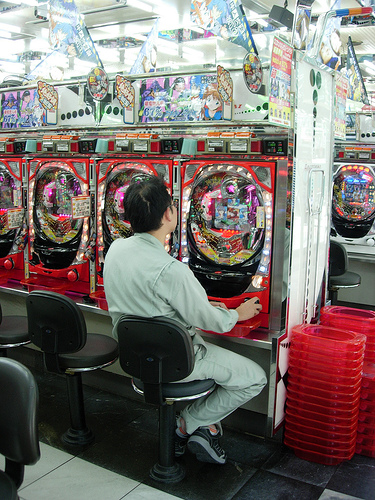A staple of the modern Japanese cityscape, pachinko parlors employ a third of a million people in Japan, draw in an estimated 30 trillion yen per year, and entice roughly one quarter of the country's entire population to play at least occasionally, 17 million of them on a regular basis.
Pachinko is a struggling industry of late, however. In the past, pachinko has benefited as Japan's “national pastime” from a special arrangement in which its more unsavory gambling-like nature has been tolerated through a third-party prize-exchange system referred to as “santen hoshiki” (三店方式) [ja]. Stricter regulations and a changing market landscape, however, are set to alter this arrangement, with one-third of all parlors expected to close in coming years. Even the support of famous American movie stars would appear to be ineffective in the face of the impending crisis and resulting declining interest in the game.

Pachinko player (by Flickr user Suviko)
The latest threat to the pachinko industry comes from plans to legalize and regulate casinos in Japan [ja], endorsed by both major parties in a rare show of unity [ja]. The move places the status of pachinko as semi-legal gambling into question, and has sparked comments and blog posts reflecting on the place of pachinko and gambling in modern Japanese society.
Many are critical of pachinko's highly addictive and ultimately destructive nature. In a post entitled “Is pachinko gambling?”, blogger Harumi writes:
私はパチンコをしないし親がパチンコに夢中で子供が亡くなることが相次いでいるので無くなってもいいと思います
そもそも違法ですよね
パチンコで破産しても自己破産の理由には出来ません
理由は、パチンコがギャンブルと見なされるからです
でも自己破産する人の多くがパチンコが原因のようです
今まで放置されてきたこと自体不思議でなりません
In the first place, they're illegal.
Even if you go bankrupt as a result of pachinko, you can't use it as a reason for personal bankruptcy.
The reason for this is that pachinko is regarded as gambling.
But the cause of many personal bankruptcies appears to be pachinko.
The fact that [this issue] has been neglected up to now is itself nothing short of a mystery.
Blogger hoopou-chu, meanwhile, wonders about the legality of casinos given a ban on gambling:
元々この「カジノ」は、日本では賭博行為の禁止に該当するわけだが、もし法案が成立した場合には賭博行為との整合性がどうなるのだろうか?
Comments responding to a J-cast article on the casino legislation brought up a number of interesting points. In comment #7, one user remarked:
借金をしてまでやる人が大勢いる時点で遊戯の域を超えている。麻薬みたいに常習性がありすぎる。何らかの規制を入れることは当たり前だと思う。パチンコって庶民の娯楽なんでしょ。換金できるから集客出来ているならただのギャンブルだよ。ギャンブル場が特に区画も決めずどこの駅前にある品格の無い国なんて日本だけ。恥ずかしい事。
News that South Korean President Lee Myung-Bak expressed concern to Japanese opposition leader Ozawa Ichirō about the status of Korean pachinko parlor operators in Japan prompted commenter #10 to point out that in South Korea, pachinko is actually illegal:
韓国は自国ではパチンコを禁止している。
みんな知っている理由でだ。
パチンコは射倖性が高く、生活破綻者を多く生み出し、サラ金の多重債務者の発生原因だからだ。
それなのに、日本政府に圧力をかけている。
自国では禁止している犯罪を日本では蔓延させよういるのだ。
パチンコは賭博であり、日本でも廃止すべき時期に来ているのは明白。
日本政府には韓国の圧力を無視して、このままパチンコ業界の安楽死の道を推進してもらいたい。
Everybody knows the reason [they do this].
It is because there is a high level of speculation in pachinko, it destroys the lives of many people, and it gives rise to [the phenomenon of] people being heavily indebted to loan sharks (sara-kin).
Even so, a lot of pressure is being put on the Japanese government.
They are spreading the crime that is banned in their homeland around Japan.
Pachinko is gambling, and it is clear that the time has come for it to be abolished in Japan as well.
I hope that the Japanese government ignores the pressure from South Korea and moves ahead as it has been on the path toward bringing the pachinko industry to an end.
Commenter #12 questioned the exclusive status of pachinko as quasi-legal gambling:
三店方式をパチンコ以外の、たとえばマージャンやポーカーゲームでやったら捕まえるだろうが。
パチンコだと捕まらないというのは、何か特別な事情でもあるのかね?
Are their some special circumstances to explain why you are not arrested in the case of pachinko?
Finally, in comment #13 one user questions the “amusement” value of pachinko:
自分の周りにも「パチンコさえしなきゃぁ良い人なのに。」なんて思える人がいますね。そんな訳で、パチンコなんて無くなってしまえば良い!
今更ですが、遊戯ではなく換金目的で打ってる人が殆どでしょ。
This is nothing new, but most people do not play for amusement, they play with the goal of exchanging prizes for money.







4 comments